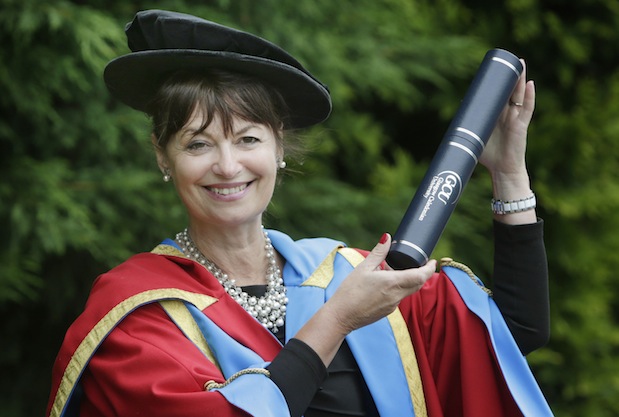The Green Blob which did for Owen Paterson has claimed another victim. Her name is Anne Glover and she was, until recently, chief scientific adviser to the President of the European Commission.
‘I believe her outstanding background and calibre will bring invaluable expertise to the Commission,’ said former president José Manuel Barroso when she was appointed in December 2011. Indeed they did, and that was the problem. As with its chief accountants (see Marta Andreasen), so it is with its chief scientists: the very last thing the EU wants is pesky experts presenting inconvenient truths which threaten to impede it from doing whatever the hell it likes. Especially not if those truths upset its powerful allies in the green lobby.
Up until May this year, Professor -Glover had seemed an ideal fit for the job. Most importantly — as Alex Salmond’s former chief scientist — she held the ‘correct’ views on climate change, even to the point of suggesting that global warming might lengthen the hours of daylight in Scotland.
But then she made the fatal mistake of being rather too outspoken and independent in a speech to Eurochambres, the Association of the European Chambers of Commerce and Industry, on the subject of the manipulation of science for political ends sometimes known as ‘policy-based evidence-making’.
One of the worst examples, she noted, was the EU’s ‘Reach’ regulation on chemicals adopted in 2006. Though as many as 36 different independent impact assessment studies had demonstrated that this would have a disastrous effect on business, the EU preferred to ignore them all in favour of its own impact study which, unsurprisingly, showed that Reach was a jolly good thing.
Another example she might have mentioned was the EU’s ban in May last year on neonicotinoids — an effective pesticide which till then was widely used in Britain on crops like oil seed rape, and which green campaigners had decided on the flimsiest of evidence was causing bee colonies to collapse. This turned out, on closer examination, to have nothing to do with science — which is why it was so heavily opposed by Paterson when he was environment secretary. Rather, it was horsetrading. The French beekeepers’ union had bullied their socialist environment minister Stéphane Le Foll into introducing a national ban. Le Foll had then sought to even the playing field by pulling strings with one of his -compatriots, Catherine Geslain-Lanéelle, at the European Food Safety Agency. Once she had brought in an EU-wide ban, Geslain-Lanéelle landed a new plum job. By happy coincidence, it involved working directly for Le Foll as France’s -director-general for agricultural, agri-food and territorial policies.
In short, Professor Glover had every right to be concerned by the way the EU -routinely twists scientific evidence to advance its regulatory agenda. The practice, she noted, is akin to the EU deciding to ban credit cards because credit cards lead to personal debt — and then commissioning a series of ‘independent’ impact assessment studies to justify the decision. But the consultancies producing these studies would have little incentive to say anything to contradict the EU’s political agenda. ‘If they want repeat business, [they] are not going to go out and find the evidence to show that this is a crazy idea.’
The thing that signed Professor Glover’s death warrant wasn’t her defence of integrity and the scientific method in general, but her courage in speaking out on genetically modified crops. As a molecular biologist she could find no evidence to justify the EU’s opposition to GM: it was a ‘form of madness’.
This was too much for the Green Blob. A number of environmental campaign groups, led by Greenpeace, wrote to the new EU Commission President Jean-Claude -Juncker urging that Professor Glover be sacked because of her ‘one-sided, partial opinions on the use of genetically modified organisms in agriculture, repeatedly claiming that there was a scientific consensus about their safety’.
Last week Juncker obliged, demonstrating to anyone who didn’t know this already just how intimate is the relationship between the European Commission and the Green Blob. As seasoned EU-watcher Richard North explains, ‘In order to expand its powers, the EU likes to be seen to be addressing issues of popular concern and the environment is ideal for this, not only because it’s fashionable, but because pollution has no borders. So it’s the perfect excuse for the EU to impose supra-national policies on nation states.’ Indeed, many green NGOs receive a large proportion of their funding from EU grants: the quid pro quo being that their campaigns — e.g. over neonicotinoids — give the illusion of independent, popular pressure being applied to the EU, urging it to do what it wanted to do all along.
The only amusing part of this sorry affair is the division Professor Glover’s sacking has caused among the greenies. While Greenpeace, Friends of the Earth and the other anti-GM lobby groups are crowing, other environmentalists such as Mark Lynas — the man who once splatted a custard pie in Bjorn Lomborg’s face and who staged that propaganda photograph of the Maldives government holding its cabinet meeting underwater — are incandescent. Lynas wrote: ‘Since when did environmental groups, whose campaigns on issues like climate change always contain frequent references to “the science”, lobby to remove scientists from the halls of power?’
Well indeed, Mark, but that’s the problem with your lot all over. You fetishise ‘the science’ when it suits you. You anathematise it when it doesn’t. Maybe it’s time you put your ideological obsessions to one side and remind yourselves that true science is altogether beyond politics. As Charles Darwin once put it — and as Anne Glover has bravely reminded us at the cost of her job — ‘A scientific man ought to have no wishes, no affections — a mere heart of stone.’
Got something to add? Join the discussion and comment below.
Get 10 issues for just $10
Subscribe to The Spectator Australia today for the next 10 magazine issues, plus full online access, for just $10.
You might disagree with half of it, but you’ll enjoy reading all of it. Try your first month for free, then just $2 a week for the remainder of your first year.















Comments
Don't miss out
Join the conversation with other Spectator Australia readers. Subscribe to leave a comment.
SUBSCRIBEAlready a subscriber? Log in